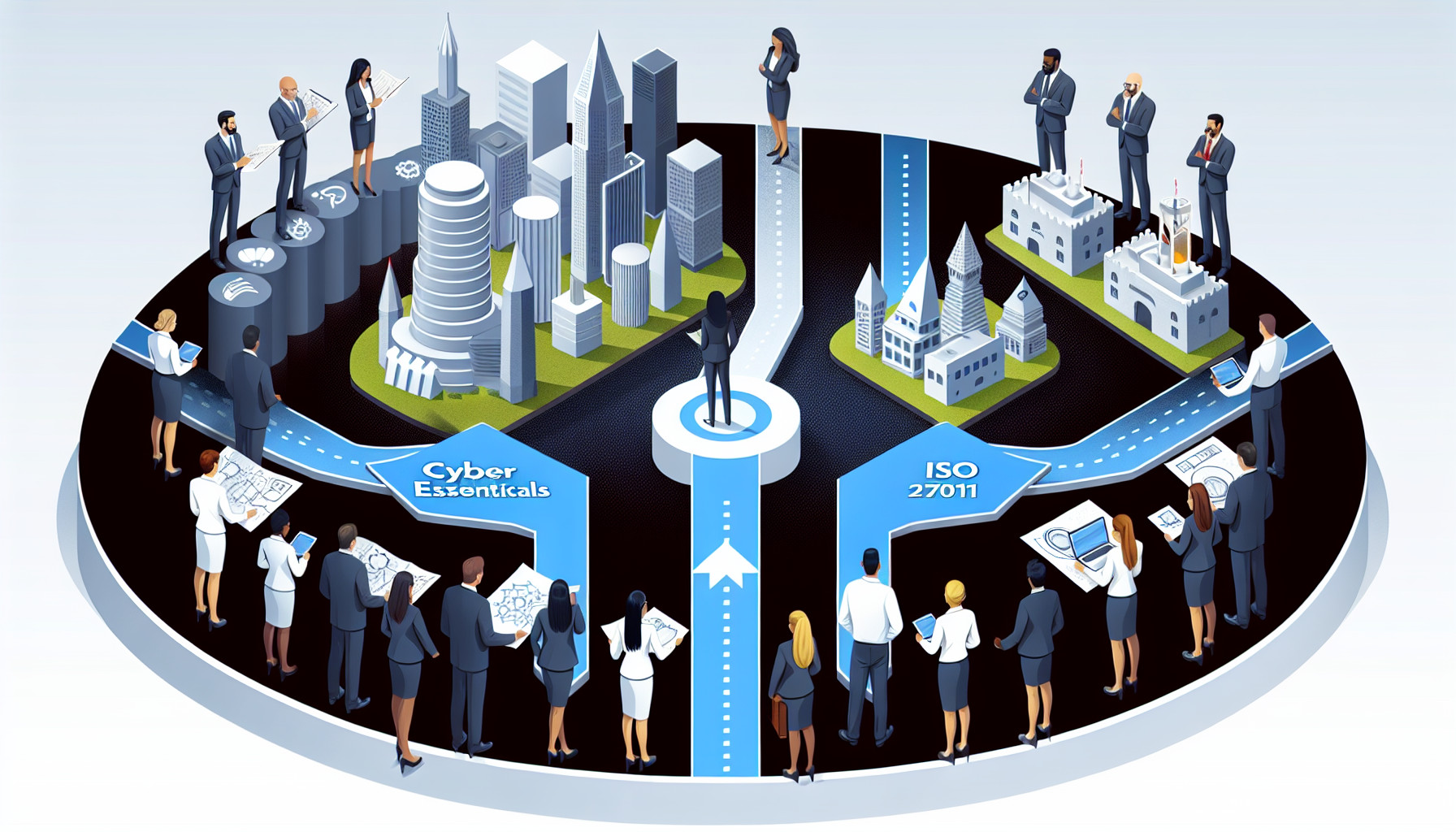
Understanding Cyber Essentials Certification vs ISO 27001
In the face of growing cyber security threats, ‘Cyber Essentials vs ISO 27001’ is a common dilemma for businesses tightening their security belts. Cyber Essentials offers a fundamental data protection first layer, ideal for those requiring UK government contract compliance. In contrast, ISO 27001 delivers a far-reaching information security framework suitable for global application. This article aims to clarify distinctions and assist in choosing the certification pathway that fortifies your organisation’s unique cyber defences.
Cyber Essentials Certification
Cyber Essentials is a UK government-endorsed certification. The National Cyber Security Centre supports it. This certification highlights the importance of basic cybersecurity measures. The Information Assurance for Small and Medium Enterprises recognises this accreditation. The Information Security Forum, in collaboration with the Government, also supports it. It targets protection against common cyber attacks. It’s an essential resource for organisations handling sensitive personal data anywhere. It’s also crucial for those vying for UK government contracts.
Cyber Essentials isn’t a one-size-fits-all certification. It offers two versions – Cyber Essentials Basic and Cyber Essentials Plus. The Basic version relies on a self-assessment questionnaire. This evaluates basic cybersecurity practices. The Plus version offers a higher level of assurance. A certified Cyber Essentials assessor conducts physical testing and auditing. This ensures compliance with the standards.
The cost for Cyber Essentials certification begins at £350 plus VAT. The exact cost of preparation for Cyber Essentials Plus varies. Cyphere offers it between £1299 and £1999. It depends on the size and complexity of the organisation. Before attempting the Cyber Essentials Plus certification, organisations need first to obtain the Cyber Essentials certification within three months. This is a prerequisite for applying for the Plus certification. However, achieving Cyber Essentials Plus is possible without getting the essential accreditation beforehand.

Cyber Essentials Plus Certification
- Protect sensitive data, protect your business
- Improve eligibility for new opportunities across regulated industries and public sector.
Unraveling ISO 27001
Conversely, ISO 27001 is an internationally acknowledged information security systems management standard. It extends beyond the basic cybersecurity measures encompassed by Cyber Essentials, providing a comprehensive framework that addresses Cyber Essentials and controls all forms of online and offline information.
ISO 27001 covers a broader scope than Cyber Essentials by addressing organisational, personnel, physical, and technical domains. It utilises a risk-based approach to prevent data breaches, examining information security in all aspects of the business, whether online or offline. This holistic approach to information security makes ISO an invaluable standard for organisations of all sizes and industries.
Securing a certification can revolutionise a business by improving its approach to information security. It includes CyEssentials’ basic controls and security update management, providing a comprehensive holistic information security management framework.
Organisations can achieve this certification by:
-
Ensuring they have the necessary documentation outlining policies, records, and procedures
-
Having their documentation audited by an accredited certification body
-
Undergoing recertification audits every three years
Key Differences between Cyber Essentials and ISO 27001
While Cyber Essentials and ISO 27001 fortify an organisation’s cybersecurity measures, their focus and scope differ. Cyber Essentials is centred on five technical controls for fundamental cybersecurity, whereas ISO 27001 covers a broader range of information security management, incorporating critical controls for risk assessment and mitigation.
This contrast in their approach makes a comparative analysis of the two certifications insightful.
Certification Process – ISO 27001 vs Cyber Essentials
There are significant differences in their certification processes.
Obtaining Cyber Essentials certification is relatively simple and quick, involving completing and submitting an online questionnaire assessed by a certified Cyber Essentials assessor. This streamlined process makes it an accessible certification for organisations of all sizes.
Demonstrating a proactive approach to cybersecurity is crucial in today’s digital landscape. One way to do this is through obtaining Cyber Essentials Plus certification.

Unlike the basic Cyber Essentials certification, the Plus version involves an independent audit conducted by a certified body like Cyphere to ensure compliance with the standards. This provides an additional layer of assurance and signals to stakeholders that the organisation is actively committed to maintaining robust cybersecurity measures.
Information security management system (ISMS)
ISO 27001, however, requires a more thorough process. To attain certification, an organisation must develop and implement an Information Security Management System (ISMS) that complies with all the standard stipulations. They must then undergo a successful audit to demonstrate the establishment of effective policies and provide evidence of compliance.
This comprehensive audit and continuous management of information security systems attest to the in-depth approach to ensure information security.
Scope and Focus – ISO 27001 vs Cyber Essentials Certification
Further distinguishing these certifications are the scope and focus of Cyber Essentials and the International Organization for Standardization (ISO) 27001.
Cyber Essentials certification primarily focuses on the five key control areas of cyber security controls validation on digital information assets:
-
Firewalls
-
Secure configuration
-
User access control is assessed via configuration reviews and manual checks
-
Malware protection is assessed via tests through browsers and email security data protection measures, including configuration of antivirus software
-
Patch management validated via vulnerability scans
These measures help organisations defend against common cyber attacks, including the risk of a cyber attack. By implementing these basic cyber security measures and practices, businesses can significantly reduce their vulnerability to cyber threats.

This makes it a crucial certification for organisations looking to fortify their technical cybersecurity measures.
ISO 27001, in contrast, offers a comprehensive approach to information security. It evaluates individuals, policies, and technology, encompassing the entire organisation, including its personnel, technology, and procedures. It also addresses unauthorised physical access and safeguards against environmental risks.
This extensive scope ensures a holistic approach to managing and reducing data security, risks and data handling practices for international organisations.
Which one for your org – Cyber Essentials vs ISO 27001 certification or both?
The decision between Cyber Essentials and ISO 27001 isn’t quite cut-and-dry. It is influenced by various factors, including compliance requirements, the organisation’s risk management approach, and specific information security risks and needs, rather than solely dictated by the organisation’s size. For instance, industries where Cyber Essentials certification is a prerequisite for securing government contracts or working with the UK Ministry of Defence and the public sector might find this certification more pertinent.
However, there are also advantages to completing the Cyber Essentials scheme before pursuing ISO certification. By doing so, organisations can reduce the initial workload for the IT aspects of ISO and are likely to have established a set of processes and records that will aid in complying with the broader ISO standard.

Some organisations might even implement both certifications to optimise their cybersecurity coverage. Cyber Essentials serves as a basis for technical cyber assurance, while ISO 27001 provides a more comprehensive holistic information security management framework. This combination offers a robust defence mechanism against a broad spectrum of cyber threats.
The benefits of combining the two
Integrating Cyber Essentials and International Organization for Standardization (ISO) 27001 into an organisation’s cybersecurity strategy can reap substantial benefits. This combination provides an expansive coverage of security measures, encompassing fundamental controls and advanced risk management strategies. This integrated approach enhances protection against sophisticated cyber threats and enables a more thorough examination of an organisation’s cybersecurity posture.
The two certifications in question complement each other, enhancing each other’s strengths. While Cyber Essentials is centred on technical cybersecurity controls, ISO takes a comprehensive approach to managing and safeguarding information assets, covering all facets of information security. This amalgamation of the two certifications ensures that no area of cybersecurity is overlooked.
Insurance companies like this approach, where organisations are proactive in demonstrating data security commitments, often leading to lower insurance premiums.
The impact on a business’s cybersecurity is of significant importance. These frameworks collaborate to provide a comprehensive framework for managing and protecting sensitive information and assets within a company. This collaboration contributes to a holistic cybersecurity strategy that effectively addresses various risks.
Achieving ISO 27001 or Cyber Essentials Certification or Both with Cyphere
As an IASME-certified certification body, Cyphere offers a wide range of services, including Cyber Essentials Plus and ISO 27001 certification services. It also provides CREST penetration testing services to high standards.
To achieve Cyber Essentials Plus certification with Cyphere, organisations must undergo a technical audit administered by Cyphere as an external certifying body. On the other hand, for other organisations to obtain ISO 27001 certification, implementing an ISMS and successfully passing an audit conducted by Cyphere, an accredited certification body, is necessary.
Get in touch for a free consultation to discuss your security objectives and get independent advice.

Cyber Essentials Plus Certification
- Protect sensitive data, protect your business
- Improve eligibility for new opportunities across regulated industries and public sector.
Apart from certifications, Cyphere extends its services to additional cybersecurity offerings. It offers CREST penetration testing and risk mitigation advice as part of its cybersecurity services. These other services can aid organisations in identifying and addressing their organisation’s systems’ unique cybersecurity risks and vulnerabilities, further enhancing their security posture.

Integrating both enhances organisational risk management by amalgamating essential technical security controls with a strategic approach to safeguarding IT infrastructure. This leads to a more flexible, scalable, and cost-efficient cybersecurity framework, making it an ideal strategy for organisations looking to enhance their cybersecurity measures.
Frequently Asked Questions
Do the standards cover the five specific controls or the overall security outcome?
The standards provide a list of controls from which organisations choose. Organisations can define managing internet attack risk as an outcome within their Information Security Management System (ISMS).
Ultimately, it depends on the organisation’s implementation based on their risk assessment.
Do Cyber Essentials and ISO/IEC 27001 assessments cover the same things?
Neither standard defines the scope of the application. Stakeholders or the organisation undergoing certification define the scope. Assessments may not cover the same things due to varying scopes.
Is there an independent assessment available?
- Cyber Essentials: Only NCSC-recognized companies can issue certificates.
- ISO/IEC 27001: Any organisation can conduct an assessment, but only UKAS-accredited bodies guarantee true independence.
Do accreditation bodies have the necessary expertise and process?
IASME manages the cyber essentials certification and accreditation process on behalf of NCSC. Any company can offer ISO/IEC 27001 certification, but UKAS accreditation confirms competence and impartiality.
Does the assessment look at specific controls or the overall outcome?
The assessment focuses on the organisation’s ISMS. Assessing individual risk management largely depends on the assessor and scope. It depends on the organisation’s implementation based on their risk assessment.
Does the CE+ assessment include physical testing?
Physical testing is not part of the standard ISO/IEC 27001 assessment.
Harman Singh is a security professional with over 15 years of consulting experience in both public and private sectors.
As the Managing Consultant at Cyphere, he provides cyber security services to retailers, fintech companies, SaaS providers, housing and social care, construction and more. Harman specialises in technical risk assessments, penetration testing and security strategy.
He regularly speaks at industry events, has been a trainer at prestigious conferences such as Black Hat and shares his expertise on topics such as ‘less is more’ when it comes to cybersecurity. He is a strong advocate for ensuring cyber security as an enabler for business growth.
In addition to his consultancy work, Harman is an active blogger and author who has written articles for Infosecurity Magazine, VentureBeat and other websites.












